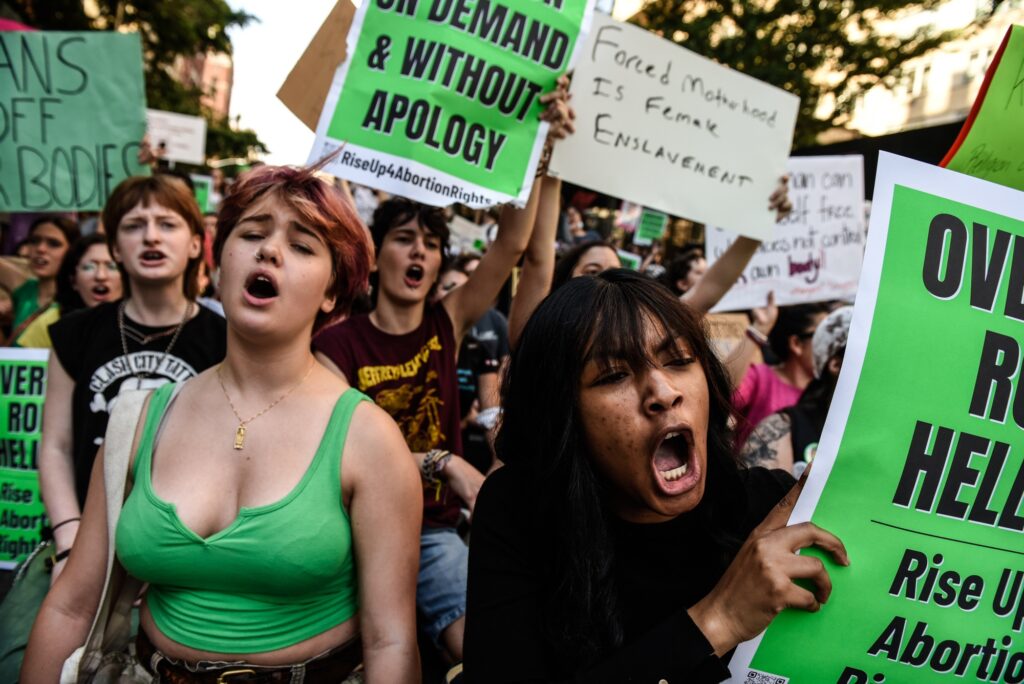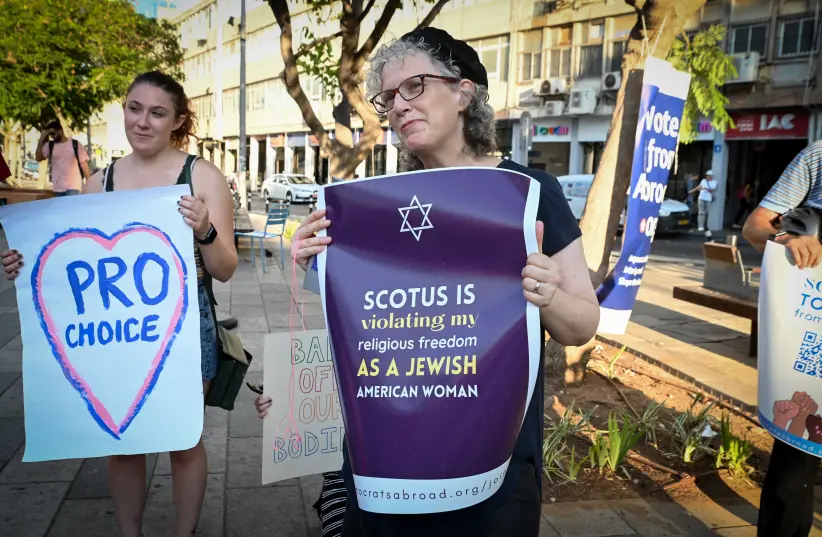ed note–All have read or heard the story of Little Red Riding Hood, who makes a trip through the woods to visit Grandma only to arrive and find herself sitting a mere few inches away from a large, hungry wolf in Grandma’s bed and wearing Grandma’s clothes. As the story goes, all the signs are there, SCREAMING AND SNARLING at her in Kristol clear indications that ‘Grandma’ isn’t Grandma at all–the big nose, the long, razor-sharp teeth, the predator’s eyes, and yet LRRH doesn’t figure it out until she gets eaten and it’s too late.
Welcome to America (and the West in general) where the wolf known as Organized Jewish Power runs everything and yet Americans–including ‘pro-life’ Christians–REFUSE to see the wolf of Judah-ism–with all its predatory attributes–devouring everything and everyone in its path, including/especially Gentile children through the grisly process of Abortion which the followers of Judah-ism embrace as fervently as if it were a sacrament, which to them it is.
Now, as far as some of the particulars in the piece below, as always, pay close attention to those sections in red and especially the CHOKING JUDAIC HYPOCRISY AND DISHONESTY that pervades the entire piece, i.e. how there must be this ‘wall’ separating ‘church and state’, and yet, the followers of Judah-ism DEMAND that no such ‘separation’ exists when it comes to their ability to murder unborn children as a sacrifice to their deity, yahweh.
Wasserman Shultz, the Jewish Congress Creature says quite clearly that it is her Judah-ism that guides her legislative actions, CLEARLY AN ABROGATION OF THE SEPARATION OF ‘CHURCH AND STATE’, and yet no one sees the glaring contradiction in it all.
As a small aside, that section highlighted in red where Sheila Katz, CEO of the National Council of Jewish Women says it ‘makes her angry when men try to govern women’s bodies’–
Imagine for a moment that the men of America began asserting that women’s bodies didn’t belong to them, using that silly story in Genesis where it says that Eve was created using Adam’s rib, therefore intimating that Eve was merely an ‘extension’ of Adam and therefore her body was in effect HIS body. Imagine then the SCOTUS declaring that based upon this notion that men had the absolute right to beat, rape, abuse and even kill women–‘Freedom of choice’–and all of this foundationed upon the premise that being created from Adam’s rib, women were not independent and ‘viable’ human beings.
Imagine some ‘pro-woman’ group agitating politically that engaging in violence and rape against women was wrong, that they were human beings and deserved equal protection under the law, the same as men…
Imagine then HORDES of men organizing, marching, screeching, screaming, taking off their clothes and exposing themselves, etc as takes place now with HORDES of deranged and diabolically-possessed womenfolk screaming ‘MY BODY MY CHOICE’ and ‘KEEP YOUR LAWS OFF MY BODY’ and all the rest of the Luciferian logic that they use in keeping the business of baby butchery alive, no pun intended…


Well, welcome to the pro-abortion position as argued by the ‘children of Israel’.
And finally, for those Little Red Riding Hood types who say that these Jews who support Abortion do so only because they have abandoned the ‘high moral standards’ of ‘authentic’ Judah-ism, please note that the PRIMARY justification for murdering children in utero comes from the Torah (Old Testament), the book of Exodus to be precise.
USA Today
When Alabama Gov. Kay Ivey, a Republican, signed into law in May one of the nation’s most restrictive abortion bans, she invoked her faith.
‘To the bill’s many supporters, this legislation stands as a powerful testament to Alabamians’ deeply held belief that every life is precious and that every life is a sacred gift from God,’ Ivey said in a statement.
This is a familiar argument for the Republican Party when it comes to abortion access. In January, Kirk Cox, speaker of the Virginia House of Delegates, cited biblical scripture when he came out against a proposed bill that would lift late-term abortion restrictions.
‘You knit me together in my mother’s womb,’ he said, quoting Psalm 139. ‘You watched me as I was being formed in utter seclusion as I was woven together in the dark of the womb. You saw me before I was born.’
But for many leaders in the Jewish faith, such interpretations are problematic and insulting.
‘It makes me apoplectic,’ says Danya Ruttenberg, a Chicago-based rabbi who has written about Jews’ interpretation of abortion. ‘Most of the proof texts that they’re bringing in for this are ridiculous. They’re using my sacred text to justify taking away my rights in a way that is just so calculated and craven.’
Rabbi Danya Ruttenberg takes issue with conservative Christians pointing to the Psalms as proof that abortion should be illegal.
Across the country, as a wave of anti-abortion legislation reinvigorates the fight over reproductive rights, Jewish religious leaders, activists and women are speaking out in favor of a woman’s right to choose, buoyed by their faith.
It’s not just that the U.S. shouldn’t be deriving law from poetic language, Ruttenberg said. It’s that the Jewish tradition has a distinctly different reading of the same texts. While conservative Christians use the Bible to argue that a fetus represents a human life, which makes abortion murder, Jews don’t believe that fetuses have souls and, therefore, terminating a pregnancy is no crime.
Within Jewish communities there’s considerable support for keeping abortion legal. Studies from the Pew Research Center show that Jews overwhelmingly (83%) support abortion. The National Council of Jewish Women, a 126-year-old organization that helped establish some of the first birth control clinics across the country, considers reproductive rights a cornerstone issue and has publicly condemned the strict abortion bans recently handed down in Alabama and Mississippi.
It’s common in this debate to hear the Christian perspective. But what’s often left out of the conversation is how Jews, who read the Hebrew Bible – referred to in Christian circles as the Old Testament – argue that their tradition condones abortion and at times insists on it.
‘This is a big deal for us,’ Ruttenberg says. ‘We’re very clear about a woman’s right to choose. And we’re very clear about the separation between church and state.’
What Jewish lawmakers say about abortion rights
U.S. Rep. Debbie Wasserman Schultz, D-Fla., likes to joke that she took tikkun olam so seriously, she wound up in politics.
Within the Jewish tradition, tikkun olam – Hebrew for ‘repair the world’ – is a sort of call to action, a concept defined by acts of kindness and service that help heal the world. Wasserman Schultz, the first Jewish woman to represent Florida in Congress, says her faith informs her politics every day.
‘I have always served and looked at policy through a distinctly Jewish lens,’ Wasserman Schultz says. ‘And so for me, when I’m thinking about a woman’s right to make her own reproductive choices, the Jewish tradition that I’ve always been taught holds that a woman’s quality of life and her pain should take precedence over that of a fetus.’
The strongest argument in the Hebrew Bible for permitting abortion comes from Exodus, Chapter 21, Verse 22-23: ‘If people are fighting and hit a pregnant woman and she gives birth prematurely but there is no serious injury, the offender must be fined whatever the woman’s husband demands and the court allows. But if there is serious injury, you are to take a life for a life.’
In this passage, ‘gives birth prematurely’ could mean the woman miscarries, and the fetus dies. Because there’s no expectation that the person who caused the miscarriage is liable for murder, Jewish scholars argue that this proves a fetus is not considered a separate person or soul.
The Talmud, a two-part Jewish text comprised of centuries worth of thought, debate and discussion, is also helpful when discussing abortion. The Talmud explains that for the first 40 days of a woman’s pregnancy, the fetus is considered ‘mere fluid’ and considered part of the mother until birth. The baby is considered a nefesh – Hebrew for ‘soul’ or ‘spirit’ – once its head has emerged, and not before.
Rabbi Elizer Waldenberg, a leading authority on Jewish law who died in 2006, wrote in Tzitz Eliezer, his major text, that ‘it is clear that in Jewish law an Israelite is not liable to capital punishment for feticide…An Israelite woman is permitted to undergo a therapeutic abortion, even though her life was not in danger…This permissive ruling applies even when there is no direct threat to the life of the mother, but merely a need to save her from great emotional suffering.’
Wasserman Schultz references pikuach nefesh, the principle in Jewish law that the preservation of a human life overrides nearly all other religious considerations, which also allows a woman to seek an abortion.
‘You can use that same principle to show that women, more than anyone else, understand their bodies and what medical decisions are right for them,’ Wasserman Schultz says.
For Wasserman Schultz, abortion access should be unrestricted, regardless of faith. ‘I’m not going to tell you that you’re interpreting Scripture incorrectly,’ she says. ‘But don’t prescribe rules for me and my decisions based on your interpretation of your scripture.’
Retired U.S. Sen. Barbara Boxer was one of the most prominent Jewish lawmakers in the country while she represented California for 24 years. There’s no doubt, Boxer says, that faith informs each person’s views on a variety of subjects. But that’s exactly what they are – personal views, not something for everyone else to comment, or legislate, on.
‘If you respect religion, then you should be pro-choice,’ Boxer says. ‘We can’t always agree 100% with each other, but we can respect each other … and I feel I am respecting religion by saying I would fight for your rights regardless of what you believe.’
Religious freedom concerns
To Rabbi Michael Adam Latz of Minneapolis, the fight over abortion rights – and lawmakers who reference their faith as a reason for why certain laws should exist – is a larger issue. That shouldn’t just worry Jews, whose tradition teaches something other than Christianity, he says. It should worry anyone who believes in religious freedom.
‘While I certainly understand that there are people who disagree with me, in a nation for which religious pluralism is a hallmark, to impose one religious tradition on this is not actually how a democracy functions, it’s how a theocracy functions,’ Latz says.
Every person of conscious, he says, regardless of their personal views on abortion, should be deeply concerned.
That sentiment is echoed by Sheila Katz, CEO of the National Council of Jewish Women. Katz has been in her role only since June, but she says she was struck in her first few days on the job by the number of volunteers and activists she saw in the streets engaging in the debate over abortion rights. It makes her angry, she says, when men try to govern women’s bodies. As a member of a religious minority, she’s particularly wary of one dominant religion trying to govern based on its faith texts.
‘As Jews, we know that true religious freedom is a shield to protect all religions and never a sword to discriminate,’ she said. ‘It often feels like religion is used to discriminate – and that is not something we stand for, regardless of the issue.’
Latz has spent time speaking on women’s rights both from the pulpit and in smaller conversations with his congregation. He says his directness can catch some people off guard. But a rabbi’s job is to teach the Torah, he says, and the Torah itself is ‘inherently political.’
